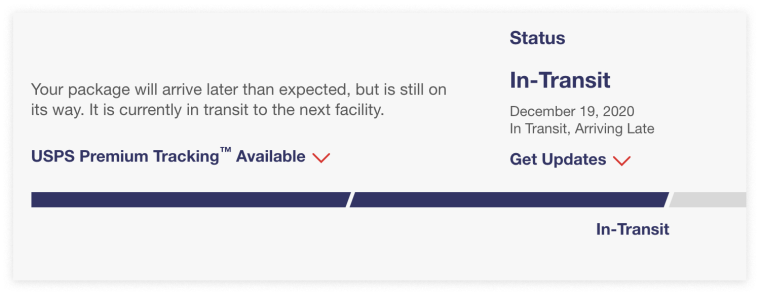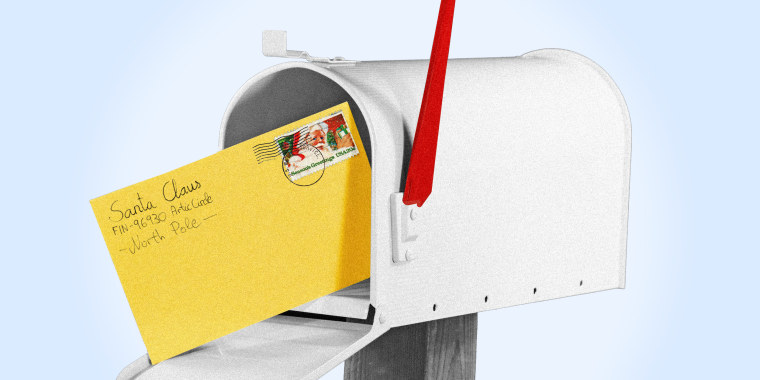As I write this, Christmas is just days away and my fiancée’s present is… somewhere in the United States of America. Where exactly, I’m not entirely sure. I’m not sure if it will actually make it here by Dec. 25 — and I can’t say that I’m surprised. Or, for that matter, all that upset.

You see, the package I’m waiting for is being shipped via the United States Postal Service and to say that the boys and girls in blue have had a hard year would be a severe understatement. Any inconvenience we, the consumers and customers of the Postal Service, have experienced this holiday season is a drop in the bucket compared to what they’ve gone through at post offices around the country.
As the packages piled up, so did the coronavirus cases in the packed sorting warehouses, where sorters showed up despite showing symptoms for fear of losing their jobs.
Remember what it was like when the pandemic kicked off in March and stay-at-home orders went out in a bunch of states? The rush of people turning to online shopping — both to keep from going outside and as a mental balm against the crushing ennui that Covid-19 inspired — and the resulting crunch left the delivery drivers at the USPS, FedEx and UPS all nearly broken under the weight of the collective tonnage of our purchases.
As the packages piled up, so did the coronavirus cases in the packed sorting warehouses, where sorters showed up despite showing symptoms for fear of losing their jobs. But while parcel shipping increased, regular mail plummeted, putting the Postal Service in a bind. Already by April, there were warnings that the USPS would run out of cash entirely before September.
Complicating things further was the war against the Postal Service that President Donald Trump launched as part of his re-election bid. Trump argued early and often that mail-in voting was rife with fraud, using this blatant lie as a reason to not provide more funding to the USPS. Congress eventually managed to get a sizable loan to a stabilizing Postal Service but not without strings. And the struggles it’s facing financially aren’t going away anytime soon.
Trump also named shipping executive Louis DeJoy as the new US Postmaster General, which only added to the chaos. DeJoy instituted changes that he and his defenders claimed were meant to maximize productivity from postal workers. Instead, his orders, including dismantling sorting machines and ordering mail workers not to finish delivering every item on their route by the end of their shift, made things worse. (DeJoy rolled back many of those changes in September in response to the outcry.)
There are currently about 641,000 postal workers working out of 31,500 facilities. Of those, nearly 19,000 have called in sick or are isolating.
Thankfully the Postal Service came through for the election, despite Trump’s best efforts. But now things are hellacious as the Christmas surge has hit, despite retailers encouraging early shopping. UPS and FedEx basically saw this coming — the former placed shipping limits on some of the biggest retailers this season to keep performance levels high. The effect, though, has been the overflow going to USPS, which already handles an estimated 40 percent of Amazon’s deliveries and the so-called “last-mile” of the private companies’ deliveries in rural areas.
“The plant’s so backed up that they’re sending raw unsorted mail, whole trays to carriers to manually sort and case ourselves,” Alex Fields, a rural letter carrier In Knoxville, Tennessee told Labor Notes. “Everyone’s spending an hour a day just casing up mail that’s supposed to be run through a machine, because there’s no one to run the machine. That’s on top of having 400 packages to deliver on your route.”
The backlog has become so severe that in some facilities employees are basically forced to craft tunnels out of the boxes, according to new reporting from the Washington Post.
“Some processing plants are now refusing to accept new mail shipments. The backlogs are so pronounced that some managers have reached out to colleagues in hopes of diverting mail shipments to nearby facilities. But often, those places are full, too. Meanwhile, packages sit on trucks for days waiting for floor space to open so the loads can be sorted.”
Having that little space to maneuver makes it hard to keep away from coworkers, raising the risk of spreading the coronavirus no matter how many guidelines the Postal Service puts into place. There are currently about 641,000 postal workers working out of 31,500 facilities, according to the USPS’s Office of the Inspector General. Of those, nearly 19,000 have called in sick or are isolating because they’ve been exposed to Covid-19.
On the flip side, small businesses have been hurt in this congestion too, with vendors tweeting and posting on Facebook messages basically saying, “delays are not our fault, so please stop yelling at us.”
The sort of dedication that it takes to have all that happening and still be as committed to delivering as many packages as possible as the Postal Service clearly is is frankly mindboggling.
Like I said, I’m not personally upset that my partner’s gift might not make it to her by Christmas Day. I am, though, having to work through a version of the guilt that I felt back in the spring, as I fretted and worried over every online purchase that we made. It’s a potent mix, this guilt, a combination of discomfort with the privilege of being able to shop online at all at a time like this and knowing that each “order now,” no matter how small, contributes to the strain on the system.
The least — the absolute least — that we can do in response is be kind to letter carriers in our neighborhoods when we see them. Don’t ask them if they know where your package is — they don’t. Don’t hassle them for late deliveries — it’s not their fault. Instead, treat each and every parcel-bearing postal worker you see like a blue-clad Santa Claus. If you want to go so far as to leave some cookies in your mailbox for them, just be sure to check for a nut allergy first. I’m sure they’ll appreciate it.

